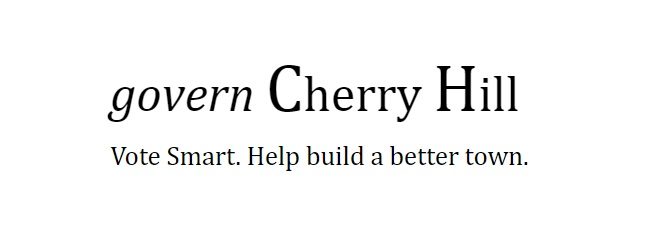Ok this may be a bit dry but I think it’s important to understand the rules of the game:
Cherry Hill has a Mayor-Council as defined by the Faulkner Act. The Faulkner Act is a state law that outlines the structure of local governments. You can read the complete text here. The specifics of Cherry Hill’s government are defined by the charter which is ordinance 81-41. The charter was adopted in 1981.
Cherry Hill has a Mayor and seven Council members elected to four year terms. The terms are staggered so either four Council members or three council members AND the Mayor are up for election every two years. Elections are held in odd numbered years, with the primary occurring in June and the general election in November. The Mayor and members are all elected by the township at large so all elected to serve the entire township.
Mayor-Council relationship is analogous to the President-Congress relationship at the national level with the Council taking the roles of the House and the Senate. The Mayor is responsible from running the executive branch which includes enforcing ordinances, supervising all departments, negotiating contracts, and preparing annual reports and budgets. The Mayor also has the power to veto and ordinances adopted by the Council however the Council can override the veto with a two thirds vote (5 members in favor instead of 4). Finally the Mayor has the power to nominate directors to head each department for approval by the Council and remove directors unless two thirds of the Council disapproves.
The Council is responsible for everything else! More specifically the Council approves the directors, passes ordinances including the budget, and oversees and investigates the action of the executive branch. The council may also remove any employee other than the Mayor and decide on salaries for the Mayor and its members. An important difference from national government is that the Mayor is a full time employee whereas the Council members are part time. Further the Council does not have the capability of drafting a budget independent of the Mayor. The Council may reduce items in the Mayor’s budget by majority vote but may only increase them with a two thirds vote. The effect of this is that the Mayor has a stronger influence on budget and the agenda.
The third major part of Cherry Hill’s government is YOU! All Council meetings must be open to the public. Additionally the Mayor is required to public hearings with the heads of each department on the budget each November. Finally citizens can propose ordinances by having a petition signed by 10% of the registered voters who turned out in the last general election. The ordinance will then go before the Council and if the Council does not approve it will be put on the ballot at the next election.
